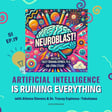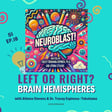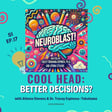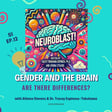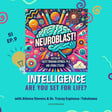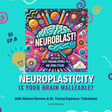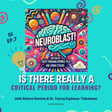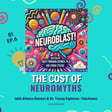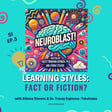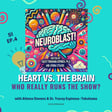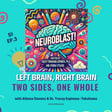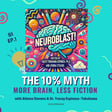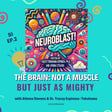Become a Creator today!Start creating today - Share your story with the world!
Start for free
00:00:00
00:00:01

There Are NO Differences in Intelligence Based on Race
In this episode of Neuroblast! we debunk the myth that intelligence varies by race, tracing its roots to flawed eugenics and biased IQ tests. Athena and Tracey highlight modern research proving intelligence is shaped by environment, not genetics. They discuss the harmful consequences of this myth and advocate for educational equity.
Original music by: Julian Starr
Transcript
Introduction to NeuroBast Podcast
00:00:00
Speaker
Hello and welcome to Neuroblast! The podcast where we don't take up four hours of your life, but still teach you something about the brain.
00:00:27
Speaker
My name is Athena Stevens. I am a neuroenthusiast, as well as an actor, writer, and creative entrepreneur.
Hosts' Backgrounds in Neuroscience
00:00:37
Speaker
And I'm Tracy Tokuhama Espinosa. I teach a course at the Harvard University Extension and Summer Schools on the neuroscience of learning, an introduction to mind, brain, health, and education. And I'm an international educational consultant.
Debunking Racial Intelligence Myths
00:00:51
Speaker
And today, are tackling a myth that when Tracey brought this up as an episode I said, really, really-- we need to have an episode about this?
00:01:04
Speaker
So, we are here to drive a stake in this stone-cold heart that is still a beating in the 2025 and we are going to kill this myth.
00:01:18
Speaker
There are no differences in intelligence based on race. There you go. And that is something that is very, very hard for people who look at only slivers of data to believe. So this belief that there's differences in brain capacity based on race is something that is as old as time. We used to have, ah we had Francis Galton, ah, Galton who was ah actually, I believe he, if I'm not mistaken, was ah ah cousin of Charles Darwin, or at least they corresponded and they talked about evolution and all the rest of this. And he pushed this eugenics movement and saw that definitely white people were superior to all others.
00:02:04
Speaker
And this myth, believe it or not, has still not died out. And it comes from people who still cling on to little slivers of data that point to things like, well, X race does more - does poorly on standardized tests compared to, you know, the other Y race or whatever.
00:02:24
Speaker
And we do see that people try to prove that there are differences in brain capacity using these kinds of, you know, terrible ideas of, of testing, which don't have real grounding and understanding what is human intelligence. And so,
00:02:40
Speaker
Yes, we have to get rid of this horrific myth that there are differences in brains based on race.
Impact of Poverty on Test Performance
00:02:45
Speaker
Um, and if you control for race, actually, if you look at all of these studies that might suggest so, if you control for race, what it really boils down to is actually poverty.
00:02:56
Speaker
and people in poverty actually do tend to do less well on all academic tests and measures, and therefore we consider them less intelligent. Um, does not mean that their potential - is not there.
00:03:11
Speaker
It's just that we don't address it in the way that we run schools these days. So, first of all, you call it a sliver of data. And I know that this is a whole big can of worms in a philosophical conversation. - Is it data or is it cherry-picked?
00:03:30
Speaker
Well, to be honest, it's actually good data, but correlation is not causation. Okay. So if you say, okay, look at this, it's very clear to me that all people of this particular race do poor on tests, therefore they must be less intelligent.
00:03:49
Speaker
They do worse on these intelligence tests. And then you say, okay, but... Yes, there's a correlation of that kind of information, but have you taken into consideration all other factors that could influence intelligence?
00:04:00
Speaker
For example, the way you're measuring intelligence. And that's actually one of the things that came up. Um, I don't know if you recall, maybe around a dozen years ago, ah the SAT in the United States came under a lot of fire because it was um culturally skewed. It was addressing or gave examples or even math problems that used... um objects and things that might not be in everybody's homes. And so because of this cultural bias to many of the intelligence tests, you do get good data, but the data then, you know, you have to ask yourself, what is that intelligence test testing?
00:04:37
Speaker
And is that, you know, something that would be understood by all um communities, all age groups, all different ethnic backgrounds
Cultural Bias in Intelligence Testing
00:04:46
Speaker
and races? And so one of the things that comes up, um,
00:04:49
Speaker
really hard and strong is that there's a lot of great evidence that there's fantastic, creative, and very different kinds of communication structures in the African American community. And Zaretta Hammond has written a lot of work on culturally responsive pedagogy. It tries to look at how kids share their ideas. And if they're not sharing it in exact proper proper English, then they are not considered as intelligent as somebody else. And so she argues for the idea that we have to you know embed our educational practices within the cultural structures of the societies that we live in, which sometimes have multiple um ethnic backgrounds, multiple racial backgrounds that have to be valued a bit more than they are today.
Critique of Intelligence Test Scope
00:05:36
Speaker
So, I remember back in the day when I was taking my AP psychology class in high school, our teacher made us take the Chitling Test, which is written in a completely different dialect that none of us middle-class white kids from the suburbs knew, and we all failed in this IQ test.
00:06:05
Speaker
Is that still thought of as a valid thing? Was it ever? Is it about universalizing these tests? Or is it about knowing exactly what is being measured? What's going on Well, absolutely everything that we have as far as an intelligence test is ah is a proxy for what we have decided is an intelligence test, right? So even the best of tests...
00:06:31
Speaker
have 14, 15, 16, 17 subtests that you also have to take because they look at not only general cognitive abilities, so memory and attention and things like that, but they also look at things like executive functions and then they look at domain specific areas. So they look at math or language or history or art or whatever.
00:06:53
Speaker
And the big questions come up here related to those domain specific areas. How can you make them, no no test is culturally agnostic, no no test is. And so because it carries this big weight here, we have to sort of buy into the idea that that is what we are agreeing to call intelligence.
00:07:13
Speaker
Which is really, um you know, you'll recall, you know, years ago, Howard Gardner gave this big pushback of saying intelligence is not binary. It's not just black or white. You are or aren't intelligent. There's multiple ways of displaying this.
00:07:27
Speaker
But that complexity of ideas does not translate into measurement
Research Biases and Global Diversity
00:07:31
Speaker
tools. We do not have assessment tools to assess intelligence with all the nuances that we can philosophically agree are there, but we don't have tools that test those kinds of things. And so and to be completely honest, a lot of the data that we might get also has another kind of um cultural bias there, and that is that we have, um um most of the studies about the brain, and when we talk about the brain and what we think we know, um these are WEIRD studies.
00:08:01
Speaker
These are, you know, of of brains that are Western and Educated and Industrialized. They're Rich and they're Democratic. And, and that is, you know, we're overgeneralizing. We're talking about neural circuits of this and neural circuits of that, but what we're really talking about are typical brains that actually went to so good schools and things like that. And so we're we're not really getting the full picture of what it is to embrace all types of intelligence. And so there's a big ah skew there. Break in on that WEIRD
00:08:31
Speaker
study because that's such a thing and I want our audience to get it. You weren't just saying that it was a study that was strange.
00:08:43
Speaker
A WEIRD study is what? A WEIRD study is studies that are based on subjects, the people who participate in the studies or give the data or provide the data are from western, educated, industrialized, rich and developed countries.
00:09:01
Speaker
And that is largely because of the nature of how laboratories are set up, isn't it? Absolutely. So um ah tons of research will come out of the U.S. and a lot of parts of Europe.
00:09:15
Speaker
It's beginning to come now, a bit is coming out now more in it from China, but you really don't get the average brain. You know, you're getting people who will volunteer for that test, who is typically a college student.
00:09:29
Speaker
they're well educated, they're from rich countries and all the rest of it And so you're not getting a lot of data that can be generalizable. And so we have this kind of two pronged problem when we talk about, are there differences in race based on intelligence?
Poverty's Link to Intelligence Measures
00:09:44
Speaker
Well, the number one problem is how are we measuring intelligence?
00:09:47
Speaker
And the way we're measuring intelligence has traditionally not taken into consideration different cultural norms and and ways of thinking, ways of knowing. And so we have tests that are not necessarily attending to all of these different groups.
00:10:04
Speaker
But on the second level is just the question itself. Can you measure intelligence? All of these ways that people can be intelligent, you really can't. And so even the best of the tools, you know, the Wechsler test and all these other ones, we have some great models out there, but we don't have um complete models. None of these tests are actually looking at all ways that humans can be intelligent. So, they're not culturally you know attuned and they are not addressing the broad range of ways that humans show intelligence. And so, making statements like, you know, there's differences in in intelligence based on race, look at the test scores is a very unfair kind of a judgment because it's not taking into consideration all of the other factors that can be baked into this idea of how people become intelligent or how we judge people to be smart or not.
00:10:59
Speaker
And in addition to cultural biases and going back to Charles Darwin's old friend, bless him, what- bless his little heart, as we would say in the South- what does affect IQ? What do we know?
00:11:20
Speaker
Well, definitely a huge risk factor in all in all cases of of any kind of measures of intelligence has to do with poverty. And poverty hits people of all races. Um, it affects certain other some races more than others, but definitely all races are are are victims of poverty.
00:11:40
Speaker
Um, and that is a huge measure. But what do you mean by poverty? Is it just low income? It actually means you have also poor nutrition, you likely have single parent households, because in the United States, we pay for education based on our tax bracket.
00:11:55
Speaker
You probably
Standardized Tests vs. Longitudinal Assessments
00:11:56
Speaker
get schools that don't have the strongest teachers possible because you're not able to pay them. And so there's a lot of things that come up with poverty. It's a Wicked Problem. It's not something that's easily solved.
00:12:08
Speaker
It has many root causes, but it also has many issues. Many of those things that I just mentioned individually have been proven to have an impact on student learning outcomes and on what would be considered an intelligence test.
00:12:23
Speaker
I have to tell you just straight out, and I guess you probably know this from, from because we know each other enough now that you, you know, that I hate I hate um standardized tests. That think that in a few minutes you can actually place a judgment on how smart or what the potential is of an individual. I really think that the newer way of approaching this is looking at people over time, longitudinally, e-portfolios from the day you're born all the way through schooling so that we can track and see how you grow.
00:12:54
Speaker
Not a single measure in a couple of hours. Um, that really never captures what intelligence is. Well, having now done three Harvard finals for two days, um, I just hate exams in general.
00:13:11
Speaker
So, what is being lost due to this myth? What is the harm being done? Um, in many ways, that's going to be unquantifiable.
00:13:26
Speaker
But using the statistics... some of these people are going to be actual geniuses and never get noticed. Yeah, that's absolutely right.
00:13:38
Speaker
And that's - part why many institutions like, like Harvard, as you know, had spent years trying to include additional factors, not just a standardized test ah score or not a GPA necessarily, but to try to see other aspects of what makes an individual interesting, important, and show potential. And so that's, um I think the biggest thing that we lose is that we're going, if we're only going to go by numbers and the numbers are only reflecting what certain populations are able to do, then it's going to be a very, very difficult upward battle to try to see how there is any equity in kind of educational experiences because we're not going to be giving people the potential, - the
00:14:21
Speaker
the chances to actually demonstrate what they know because we're using measures that already judge them to be, you know, at a deficit. And so there's a huge loss for all, you know. A mind is a beautiful thing to waste. I don't know, or is a terrible thing to waste? I don't know if you remember those, mind is a terrible thing to waste. That was the the saying
Brain Studies and Intelligence Myths
00:14:41
Speaker
back when I was really little growing up, I remember hearing that on TV all the time and trying to get people to donate to different types of funds, educational funds for special populations.
00:14:52
Speaker
I don't know if that's necessarily the way to go. I do think that a better way would be to like globally look at humans and how humans evolve and human... achievement in human and and the complexities of understanding what does it mean to be intelligent.
00:15:08
Speaker
That is a hard question. If you ask any great scholar today, what does it mean to be smart? Not one of them is going to tell you, well, you've got a good score on a test. And that's the one thing that we know it's so sad is that if you train, I used to train kids to do to get perfect SAT scores. All you got to do is know when to guess, how to guess, how to eliminate. I mean, it doesn't mean that you know stuff, right? And so it's the wrong way to measure whether or not somebody deserves um to be given a chance to continue on with their education and to go deeper and higher and to...
00:15:40
Speaker
into you know more important topics. And so I think we really have to rethink the whole way that we ah measure and judge people. um And really just um to level the playing field, we have to look at this lowest common denominator. Really, what does it mean to grow and to learn?
00:15:56
Speaker
um It's a very different thing than testing intelligence in our old school ways. Can we put this to bed finally in our little teeny tiny Neuroblast way that race does not determine - intelligence.
00:16:14
Speaker
Period. You are absolutely right. That's it. Any more than my lipstick color determines my intelligence. One, one very interesting way to look at this is if you, um and they there are some fun studies that actually try to to to poke fun at this this entire myth by so looking at deceased brains that have been autopsied. And then, you know, here's a genius brain, here's another genius brain, which one of them was the Chinese guy and which one of them was the white guy and which one of them was the black guy? No, there's, you can't tell looking at the brain.
00:16:52
Speaker
Given that I took a neuroanatomy exam last night that was four hours long, I feel like I can't tell anything about a brain.
Limitations of Current Research Approaches
00:17:04
Speaker
Your brain is spent in that sense. My brain is mush. Um, in scientific research... Some people, a handful of really good people are doing the hard questions, but most people look for what is easy to measure.
00:17:24
Speaker
And it's quite easy to measure ah person's age, gender, and race. And so we oftentimes see tons of studies that come through and you think, well, what does that have to do with actually getting to any real understanding about things?
00:17:39
Speaker
But they are very easy to measure. And so instead of tackling the hard problems, people are looking for the easy data. And that data is more commonly available, which is why it shows up in so many different types of testing.
00:17:53
Speaker
And so so much type of, so many different types of research. 'Cause it's easy to publish.
00:18:01
Speaker
And we all want to publish. And that is a whole different podcast for another day. So just so that you know, it's a real thing and it's a real sad thing because people aren't asking the really interesting questions.
00:18:16
Speaker
They're asking the questions that are easy to answer with the data that's available. So there are no differences in intelligence based on race. But quite possibly, there are differences in intelligence - based on the questions you're willing to ask.
Advocacy for Equitable Education
00:18:34
Speaker
Exactly. Exactly. And that is, you know, are you willing to go into these subtle understandings of what intelligence really means? Are you looking at harder instruments that are more complex and not a timed, standardized, multiple choice test?
00:18:49
Speaker
Are you doing things that are difficult? And that is really, really hard. And that's probably the bigger question here. There are no differences in race but there are differences in accessibility to data, which is probably the main driver that this still remains alive as a myth.
00:19:05
Speaker
So that to me sounds like the action point for our audience. We can say push for better equitable access to education and opportunity. Yes.
00:19:19
Speaker
But start at home. Push yourself to learn some way to create more opportunity for those right in front of you.
00:19:34
Speaker
I think more than anything, Athena, it's really getting people to ask harder questions. Yeah. Um, it's not, and we are you know, you know what it it's like. And, it's never done it's just due-- you do a hard research thing.
00:19:46
Speaker
paper and it really just feels unending, and which is why people in doctoral studies do tend to sometimes are reaching for the lower hanging fruit. You know, this is easy. I can get this done faster.
00:19:57
Speaker
i can, but it's, it's not the contribution you're hoping to make I think and you should go back to that and really revisit that inside yourself before you decide you want to be a researcher or to do a doctoral program.
00:20:10
Speaker
Am I willing to ask hard questions? Am I willing to look at more creative and difficult solutions in order to do things like measure intelligence in the most equitable way possible?
00:20:21
Speaker
Yeah, indeed and I think that is the call to action. Equal access, of course, does mean different things to different people, but ask the hard questions.
00:20:34
Speaker
That's it. That's it. If you found this episode important please like, subscribe, and share with others.
00:20:46
Speaker
I think it's important. For God's sake, let's put this myth to rest. Turn out the light, shut the door, and throw it in a concrete block and never see it again.
00:20:59
Speaker
Throw away the key as well. Okay. Yeah. Okay. Throw it in a concrete block and see if it floats.
Conclusion and Acknowledgments
00:21:05
Speaker
Okay. Neuro blast is produced by AGEIS Productions - with music by Julian Starr and thank god he's probably gonna help me edit this, this one. Special thanks to all of you guys who have listened consistently over the past several weeks and helped us build an audience. It's really fun to see it grow and we're just getting started so-
00:21:36
Speaker
Keep those neurons firing and we will see you next time.
